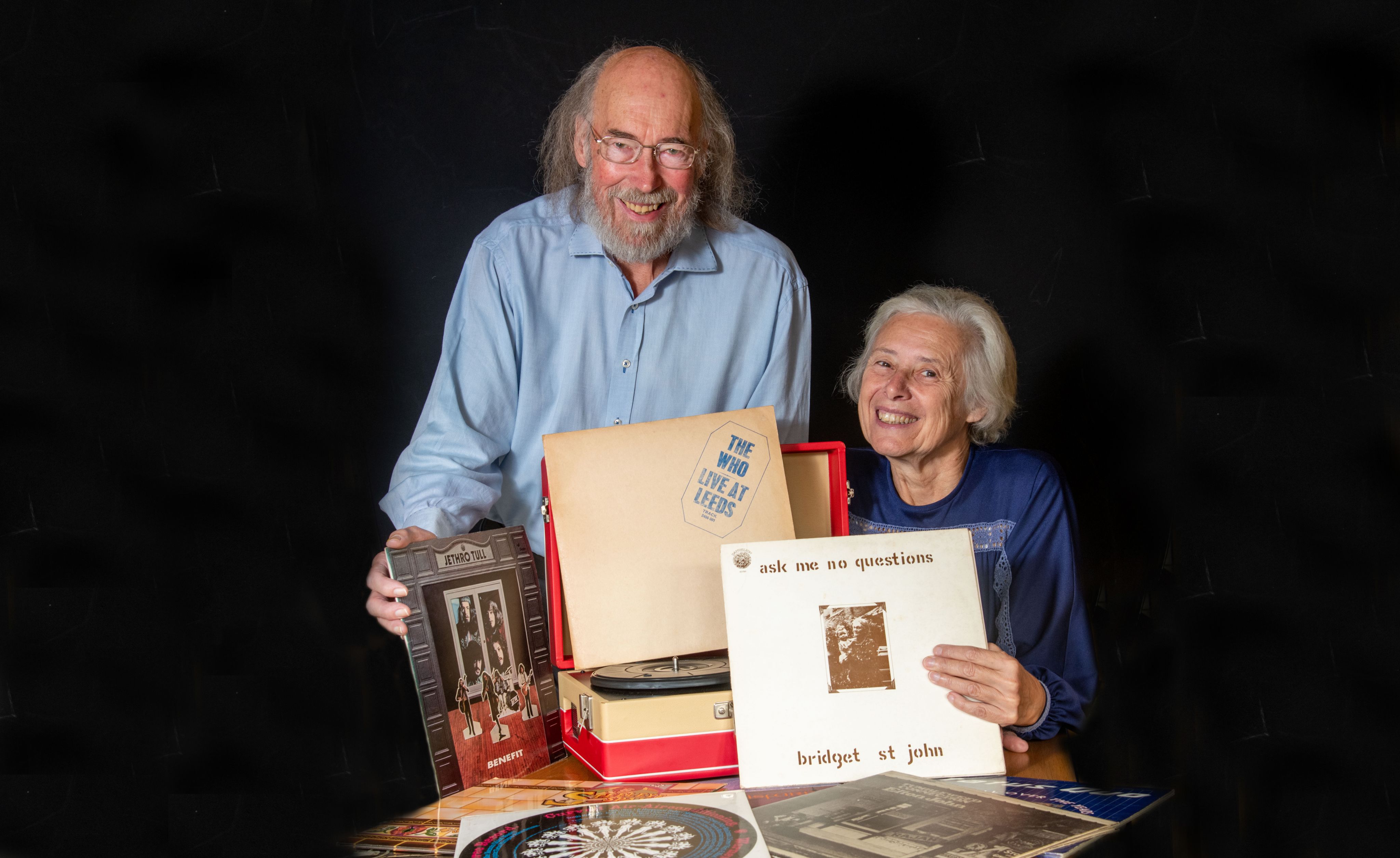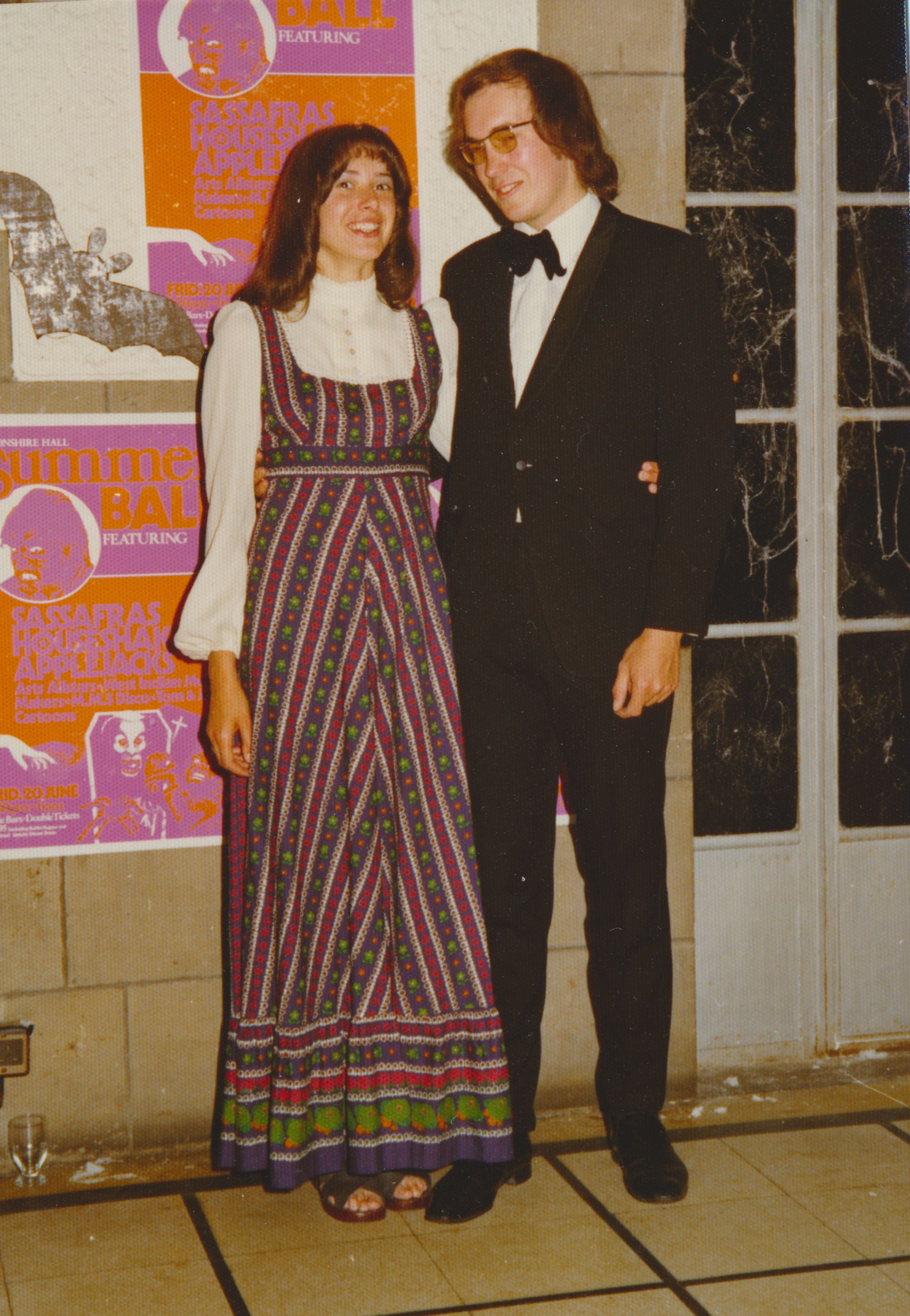Talking about our generation

From organising a Wings concert with a few hours’ notice, to being one of the busiest bassoonists in West Yorkshire, Paul (studied Engineering 1969-72) and Diana Monahan (Maths 1974) reflect on what Leeds means to them.
“I was dragged out of a lecture to come to the telephone,” says Paul Monahan, recalling a memorable day from his time leading the Leeds University Union stage crew. “It was Paul McCartney. Wings had been in Newcastle and wanted to break their journey to London by playing on campus that afternoon.”
This was February 1972, and the then LUU stage manager was in his final year reading Electronic Engineering at Leeds. And somehow, he made it happen: “I had to find the crew and persuade the refectory staff to end lunch early so we could get the set built. By 1pm, word had got round and about 1,000 people were queuing for tickets.”
Paul had arrived at Leeds in 1969. “My school in Reading pushed pupils to apply to Oxbridge. I knew that wasn’t for me and wanted to be further from home.”
He soon realised he'd chosen the wrong course at Leeds: “It was very theoretical, and the new ‘modern’ maths we’d learned in school was completely unsuitable.” As someone who had been building electrical equipment since his early teens – including prototype disco lighting which pulsed in time to the music – Paul was frustrated at the lack of practical application in the course. “It had nothing to do with real world electronics.”
Even so, he stayed on the course, and by the time Diana arrived two years later to study maths, Paul had thrown himself into his work with the stage crew, helping at events in the Union and halls of residence. The couple met by chance during Diana’s first week when she was looking for the friends she was due to meet in the Charles Morris Hall bar. She too had decided against Oxbridge: “I’d been at a mixed school, and I didn’t fancy a single-sex college.”
I had to announce to a huge hall that David Bowie refused to play. After the announcement I just ran away and hid.”
Diana excelled as a musician, graduating at school from recorder to bassoon. And at Leeds, she supplemented her grant as a semi-professional musician: “There was a big demand for bassoon players. I played in five different orchestras – I was rehearsing almost every night and playing in concerts and shows on the weekend.”
It was a momentous era. “Our time as students followed closely on ‘the summer of love’ and the 1968 student riots in Paris,” says Paul. “Society was becoming more tolerant and open.”
At the same time, a new swathe of concrete buildings was being rapidly constructed to accommodate an increasing student population. Bands such as The Who, The Rolling Stones, Led Zeppelin and Genesis were putting Leeds on the rock map, and Paul saw most of them at close quarters. “All the bands wanted to come and play in Leeds. Pete Townshend said the audiences were really receptive and knowledgeable and our stage crew was like a well-oiled machine."

Even so, there were some drawbacks to being in charge: “I had to announce to a huge crowd that David Bowie refused to play. After the announcement, I just ran away and hid.”
Diana would help backstage: “I used to wear ear defenders; it was too loud for me. I was more interested in classical music anyway.” In folk music and bands such as Focus and Jethro Tull she and Paul soon found common ground.
By this time, Paul had a flat on Cardigan Road, which overlooked the cricket ground. “It’s amazing how popular you can be when there’s a Test match on,” he says.
Despite Diana’s help with his maths, Paul failed to graduate. As much as he loved his days managing the biggest concerts LUU has ever seen, he decided not to pursue a career in the music industry, eventually moving into computing. He worked on installations, programming and systems analysis at a time when the industry was still in its infancy.
Meanwhile, Diana was focused on her own education, graduating in 1974, completing a PGCE and starting work as a maths teacher, before specialising in teaching children with visual impairments. The couple married in 1976, initially living in Leeds before moving to the West Midlands where they lived on a canal narrowboat while pursuing their careers.
After eventually leaving his career in computing, Paul channelled his energies into a business supplying services for narrowboats and carrying cargo such as coal, sand and beer. Since selling the business the couple have settled into a canalside home in Hebden Bridge in the Pennines, though they retain a boat on which they explore Britain’s 2,000 miles of waterway.
Diana is a pillar of the local history society and gives regular talks on aspects of Hebden Bridge's past. Paul was a local councillor for many years and served a term as Mayor. Both are flood wardens in a community where steep valleys and ageing drainage make it particularly vulnerable during heavy rainfall.
And in retirement they have reconnected with Leeds – first as VIP guests when The Who returned in 2006 and then as attendees at the University’s Meet The Researchers events, which showcase key areas of research. “We were really impressed by the work in using microbubbles to target cancers and in stroke rehabilitation robotics,” says Paul.
The couple have now pledged a gift in their Will to support postdoctoral research in science and medicine. “I may not have graduated, but Leeds was still the foundation for our lives,” says Paul. “We don’t have children and so leaving a legacy seemed an obvious way to support the University long into the future.”
Brotherton Circle
Find out more about leaving a gift to the University in your will and about the Brotherton Circle, a group of alumni and other supporters who have made this special pledge to the University.